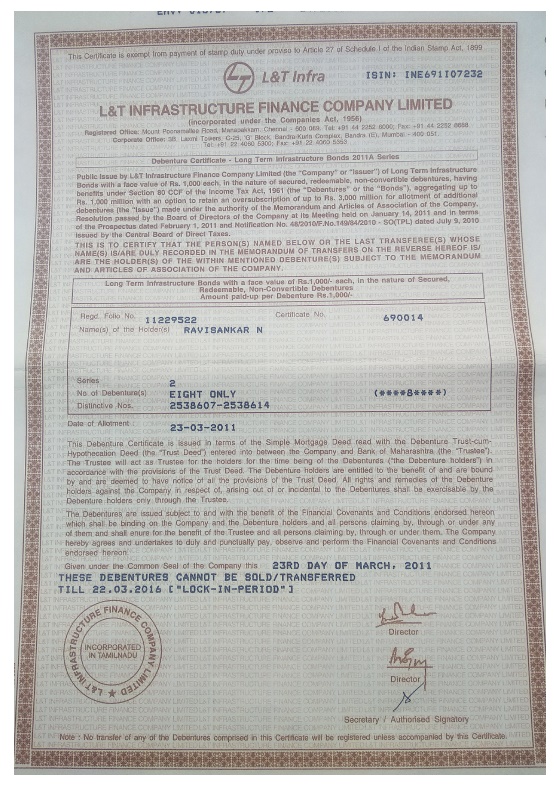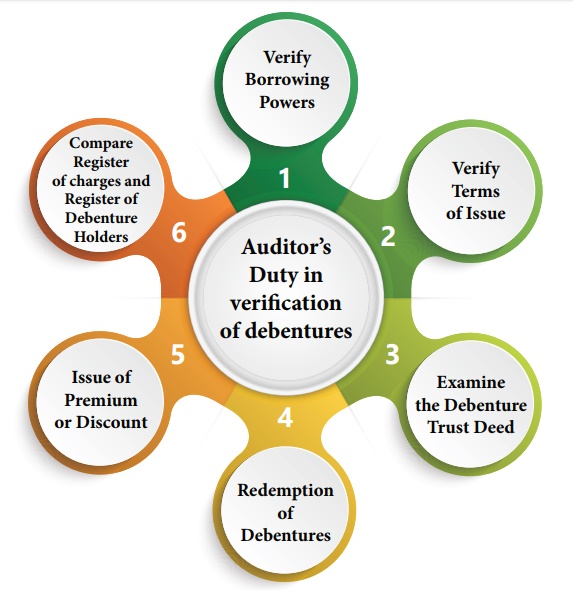Meaning, Types, Auditor's Duty - Auditing - Verification of Debentures | 12th Auditing : Chapter 6 : Verification of Liabilities
Chapter: 12th Auditing : Chapter 6 : Verification of Liabilities
Verification of Debentures
Verification of Debentures
Debentures ‚Äď Meaning
Debenture
means a document issued by a company to raise finance. It is an acknowledgement
of a debt which is given under the common seal of the company.

Types of Debentures
1. Registered Debentures: Registered Debentures are those which are
transferable only by transfer deed names, address and particulars of the
debentures possessed by holders are entered in the register. Interest is paid
to one whose name appears in the register.
2. Bearer Debentures: Bearer
Debentures are those which are
transferred by mere delivery and company does not keep any record of debenture
holders name and address. Payment of interest is made on submission on coupons
attached to the debentures.

3. Secured Debentures or Mortgage Debentures: Mortgage
debentures are those debentures that
are secured either on a particular asset called fixed charge or on general
assets of the company called floating charge. Mortgage debentures are also
called collateral debentures. In this case, debentures may also be issued to
banks and financial institutions as addition or subsidiary security along with
certain principal security. Lending institutions can exercise their right as
debenture-holders, if the company does not pay its loan and the principal
security falls short.
4. Un-secured or Naked Debentures: Naked
debentures are those which are not secured, companies of very good standing are
able to issue Debentures of this type. They are not very common.
5. Redeemable Debentures: Redeemable Debentures are those debentures which
are redeemed or the payment of which is made after a specified time.
Debentures
are redeemable in the following manner:
(i) At
the expiry of a specified period at par or at a premium.
(ii) Through
purchase in the open market any time, at the price prevailing in the market.
(iii) By
annual drawings.
6. Irredeemable Debentures: Irredeemable Debentures are those for which the
issuing company does not fix any date by when they should be redeemed and the
holders of such Debentures cannot demand payment from the company so long as it
is going concern. Usually such Debentures are repayable after a long period of
time or when the company is winding up.
7. Convertible Debentures: Convertible Debentures are those whose holders are
given the option to convert the debentures fully or partly in to equity shares
after a specified time. Those which are fully convertible are called fully
Convertible Debentures and those which are partly Convertible are called partly
convertible debentures.
8. Non-convertible Debentures: Non-convertible
debentures are those whose holders have no right to convert them into equity
shares.
Auditor's Duty in Verification of Debentures
The
auditor should note the following points while verifying debentures:

1. Verify Borrowing Powers: The auditor should verify the Memorandum and Articles of Association of the company and verify whether the company has got the power to issue debentures and ascertain the borrowing limits of the company.
2. Verify Terms of Issue: He
should ensure that the terms of the
issue have been complied with.
3. Examine Debenture Trust Deed: He should examine the Debentures Trust
Deed to know the amount of debenture issued and securities offered and he
should obtain a certificate from the debenture holder to confirm the debenture
amount.
4. Redemption of Debentures: He should make an inquiry regarding Debenture
redemption and verify the Articles of Association for the Debenture redemption
fund.
5. Issue at Premium or Discount: He should examine whether premium or
discount on issue of Debentures are properly disclosed in the Balance Sheet.
6. Compare Register of Charges and Register of
Debenture Holders: He should
compare the register of charges and register of debenture holders and check
whether it is recorded correctly and verify that the assets mortgaged or
charged are clearly indicated in the Balance Sheet.
Related Topics